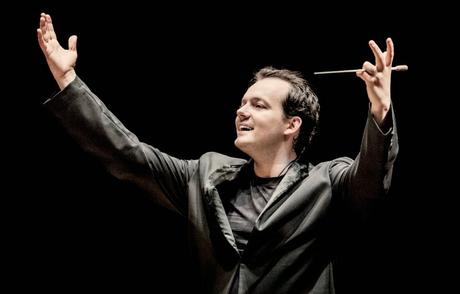Andris Nelsons conducts the BSO at Carnegie Hall.
by Paul J. Pelkonen

New Boston Symphony Orchestra music director Andris Nelsons.
Photo by Marco Borggreve. © 2014 The Boston Symphony Orchestra.
The Boston Symphony Orchestra has a new music director. Andris Nelsons has appeared at Carnegie Hall with that storied ensemble before, but Wednesday night marked the Latvian conductor's first New York performance with the BSO in his first season occupying the post. For the first night of three programmed concerts, Mr. Nelsons chose a program emphasizing the inner monolog of the creative mind, playing works by Mozart, Gunther Schuller and Richard Strauss that delved deep into the psyches of their respective creators.
Mr. Schuller wrote Dreamscapes in commemoration of the 75th anniversary of Tanglewood, the BSO's summer home in the Berkshires. According to the composer, the work was inspired directly from the 89-year-old composer's dreams, drawing on neo-classical forms and Mr. Schuller's wide-ranging influences including modern music and jazz. This was the first New York performance of this little symphony, three movements and just eleven minutes in length. Mr. Schuller packed a wealth of ideas and orchestral trickery into these short frames.
It opened with a short Scherzo, sounding a little like cartoon music or early Shostakovich. Brassy fanfares stopped in the middle, yielding to tootles of winds and blurts of percussion. This gave way to a muffled slow movement, with muttering strings and growling brass evoking a nocturnal mood. A kaleidoscopic finale featured solo cello, violin, and more percussion, finally waking the dreamer with a single, violent dissonance. Following the premiere, Mr. Schuller stood up in the front of the house and took a bow.
The orchestra then reduced itself in size and was joined by pianist Richard Goode for Mozart's 27th and final Piano Concerto. At this late stage in his brief life, Mozart remodeled the adversarial nature of the concerto into more of a collaborative effort. Orchestra and piano took a reflective approach to the opening movement, with the soloist's fluid, easy tone blending perfectly with winds and strings. Mr. Goode and Mr. Nelsons worked closely to achieve a tranquil harmony, with the former taking flight in the composer's own cadenza just before the movement's final bars.
The second movement was taken dead slow, with the piano's solo line stretched near a breaking point. The orchestra produced operatic melodic lines, with Mr. Nelsons carefully weaving them in counterpoint to the piano. The concluding Rondo (again taken at a dignified, slightly faster tempo) showed conductor and soloist choosing clarity of orchestral texture and a simple beauty in the solo passages. Overall, this performance was one that consistently chose eloquence over excitement.
Excitement finally arrived with Strauss' Ein Heldenleben ("A Heroic Life.") This six-movement autobiographical tone poem allowed Strauss some measure of revenge on his critics and considerable indulgence in excessive and celebratory orchestration. Mr. Nelsons drew a bold, invigorating sound from the cellos to open the first movement, answered by an upward surge from horns and trumpets. The BSO players burst with energy and robust good humor as their new chief urged them forward into the thematic development.
In "The Heroes Enemies" (depicting music critics as clucking yardbirds) winds were clean and precise, as was concertmaster Malcom Lowe in the tender violin solo ("The Hero's Companion") depcting the composer's wife Pauline. Trumpets and drums led the charge in "The Hero's Battlefield") playing with overwhelming power both onstage and off. The "Hero's Works of Peace", (featuring Strauss slyly quoting his own greatest hits) verges on narcissism but that was no fault of conductor or orchestra. In the finale, a slow duet for horn and violin (representing the Strausses themselves) ended in a glowing series of rising chords--Strauss' last self-quote, this time from Also Sprach Zarathustra.

